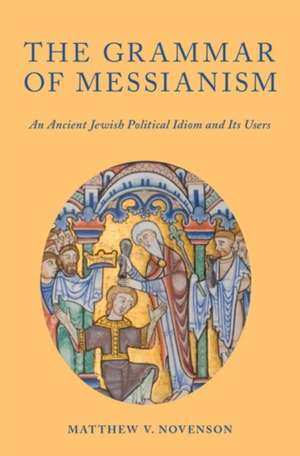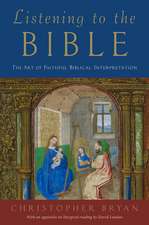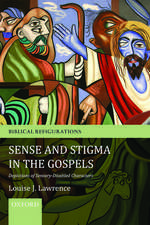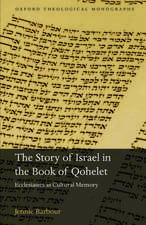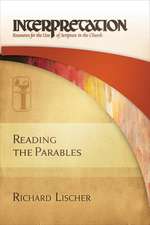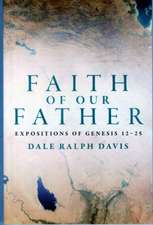The Grammar of Messianism: An Ancient Jewish Political Idiom and Its Users
Autor Matthew V. Novensonen Limba Engleză Paperback – 9 mai 2019
| Toate formatele și edițiile | Preț | Express |
|---|---|---|
| Paperback (1) | 253.08 lei 31-37 zile | |
| Oxford University Press – 9 mai 2019 | 253.08 lei 31-37 zile | |
| Hardback (1) | 659.02 lei 31-37 zile | |
| Oxford University Press – 15 iun 2017 | 659.02 lei 31-37 zile |
Preț: 253.08 lei
Preț vechi: 290.94 lei
-13% Nou
Puncte Express: 380
Preț estimativ în valută:
48.44€ • 50.43$ • 40.93£
48.44€ • 50.43$ • 40.93£
Carte tipărită la comandă
Livrare economică 26 februarie-04 martie
Preluare comenzi: 021 569.72.76
Specificații
ISBN-13: 9780190053215
ISBN-10: 0190053216
Pagini: 384
Dimensiuni: 155 x 231 x 23 mm
Greutate: 0.57 kg
Editura: Oxford University Press
Colecția OUP USA
Locul publicării:New York, United States
ISBN-10: 0190053216
Pagini: 384
Dimensiuni: 155 x 231 x 23 mm
Greutate: 0.57 kg
Editura: Oxford University Press
Colecția OUP USA
Locul publicării:New York, United States
Recenzii
Novenson surveys and successfully disrupts the discourse about messianism, and his fresh approach suggests new directions for scholarly inquiry on the messianic idea by utilizing methods and techniques from literary studies ... Upper-level and graduate students as well as senior scholars in literature, religious studies, and theology will find great reward in this inquiry.
From a new angle, and with a fascinating range of biblical, rabbinic, and patristic instances ... Whatever conclusions are reached by students of messianism, they will not be sorry to have read this stimulating and informative book.
combine[s] a close engagement with an impressive array of scholarship and its history, exegetical rigour, and attention to a wide range of primary sources, with a clarity of argument and style.
Matthew Novenson's study of ancient messianism is revisionary as well as elegantly simple [and] has enormous implications for understanding the Jewish origins of Christianity and a variety of New Testament texts.
Matthew Novenson deconstructs and de-mystifies 'the messianic idea,' a ghost of nineteenth century scholarship on ancient Judaism and early Christianity, by focusing on the way inherited scriptures were used in new social contexts. In the process, he injects a healthy dose of historical realism into a subject that has often suffered from vagueness. This is an important contribution to the study of Judaism and Christian origins.
The import of the term 'messiah' lies not in whom it names, urges Matthew Novenson, but in how it works. By attending to various projects of scriptural interpretation, from ancient texts through to the modern scholarship on them, he offers his reader a fresh conceptualization of an entire area of biblical research. Both in its scope and in its aims, The Grammar of Messianism is an outstanding accomplishment.
In this powerfully argued book, Matthew Novenson offers a fresh approach to the study of ancient Jewish and Christian messianism, urging us to jettison the concept of the 'messianic idea' that has dominated much of scholarly discussion and to replace it with an understanding of messianism as an interpretive tradition, and then demonstrating how fruitful this approach can be.
From a new angle, and with a fascinating range of biblical, rabbinic, and patristic instances ... Whatever conclusions are reached by students of messianism, they will not be sorry to have read this stimulating and informative book.
combine[s] a close engagement with an impressive array of scholarship and its history, exegetical rigour, and attention to a wide range of primary sources, with a clarity of argument and style.
Matthew Novenson's study of ancient messianism is revisionary as well as elegantly simple [and] has enormous implications for understanding the Jewish origins of Christianity and a variety of New Testament texts.
Matthew Novenson deconstructs and de-mystifies 'the messianic idea,' a ghost of nineteenth century scholarship on ancient Judaism and early Christianity, by focusing on the way inherited scriptures were used in new social contexts. In the process, he injects a healthy dose of historical realism into a subject that has often suffered from vagueness. This is an important contribution to the study of Judaism and Christian origins.
The import of the term 'messiah' lies not in whom it names, urges Matthew Novenson, but in how it works. By attending to various projects of scriptural interpretation, from ancient texts through to the modern scholarship on them, he offers his reader a fresh conceptualization of an entire area of biblical research. Both in its scope and in its aims, The Grammar of Messianism is an outstanding accomplishment.
In this powerfully argued book, Matthew Novenson offers a fresh approach to the study of ancient Jewish and Christian messianism, urging us to jettison the concept of the 'messianic idea' that has dominated much of scholarly discussion and to replace it with an understanding of messianism as an interpretive tradition, and then demonstrating how fruitful this approach can be.
Notă biografică
Matthew V. Novenson is Senior Lecturer in New Testament and Christian Origins at the University of Edinburgh. He has also been a visiting professor at Dartmouth College and Duke University and a visiting research fellow at Durham University. He is the author of Christ among the Messiahs (Oxford University Press, 2012).
